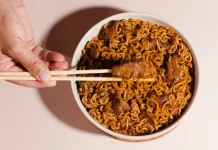Whether it is about controlling diabetes, preventing obesity, or keeping the heart healthy, brown rice is always an option. It has all the nutrients that humans and animals seek. As a caring dog owner, you must have also thought, Can dogs have brown rice?
Luckily, brown rice is a safe treat for dogs. Thanks to its B vitamins, minerals, zero cholesterol, and zero toxins. If you ever think about adding more nutrients to your dog’s diet, brown rice can be a good one. Along with providing health benefits, this rice can aid in many diseases.
Anyway, brown rice can sometimes be a bane for dogs’ lives if we don’t become certain of its safety concerns.
Table of Contents
Can Dogs Have Brown Rice?
Dogs can have brown rice as it does not have any toxic mixtures. In fact, brown rice is loaded with nutrients like calcium, iron, magnesium, omega-3 fatty acids, potassium, fibre, and B vitamins. All these nutrients are essential for dogs. Hence, brown rice can be a good addition to a dog’s diet.

Although this grain is safe for dogs, they can’t have it as much as we can. Since dogs rely on dog foods, human foods should be given to them moderately. Also, you can’t add any flavour or spice to this treat.
Can Brown Rice Be Good For Dogs?
Most commonly, we feed white rice to dogs. But the fact is, brown rice is more nutritious than white rice. White rice is high in glycemic index, which can increase blood sugar levels. Brown rice has a lower glycemic index, so it can be a safe alternative compared to white rice for dogs with blood sugar issues.
According to a Purina nutritionist, brown rice has bran parts, which make its outer layer brown. Besides, it has a coat that stores the nutrients. That’s why we get more health benefits from brown rice. If you think your dog has a nutrition deficiency, brown rice can be their best friend.
Dogs find brown rice hard to digest compared to white rice. It means brown rice can be a saviour for dogs dealing with diarrhoea or sensitive stomachs.
Can Brown Rice Be Bad For Dogs?
Brown rice can sometimes be a bad addition to your dog’s diet. As said earlier, brown rice is hard to digest. So if your dog is having constipation, brown rice can worsen his condition. One reason why dogs find brown rice difficult to digest is because it has starch and is highly processed.
Another reason why brown rice can be bad for dogs is its high amount of carbs, which is also inevitable in white rice. Dog foods already have an ample amount of carbs, so feeding brown rice to dogs will add more carbs to them, which is unnecessary. That’s why we say to offer brown rice to dogs in moderation.
How Much Brown Rice Can Dogs Have?
Dogs should have 90% dog food and 10% human food in their entire day. It means brown rice will fall into their 10% diet.
Brown rice has a high amount of carbs and calories, which dogs don’t need. If you are not certain about the amount of carbs required for dogs, you may check the dog food’s label. It will surely have the percentage of carbs mentioned. Make sure you feed your dogs less brown rice than that percentage.
Let’s make it easier for you. A small bread shall not have more than three tablespoons of brown rice, and a large breed shall not have more than five tablespoons of brown rice.
Benefits Of Having Brown Rice For Dogs
Brown rice can be a superfood for dogs if taken correctly. However, its health benefits are immense, thanks to its loaded nutrients. For instance, brown rice has B vitamins like riboflavin, folate, thiamin, and niacin. Riboflavin acts as an antioxidant that can protect your dog from free radicals. Folate will help with cell function and growth, whereas thiamin will improve the nervous system. Lastly, niacin will prevent inflammation and improve blood circulation.

Brown rice is also rich in minerals like potassium, magnesium, zinc, copper, iron, and selenium. These nutrients will help your dog have healthy muscles, bones, a healthy brain, growth, and an immune system. Besides, this rice has less fat and sodium, so you don’t have to stress about gaining weight with your dog. With soluble and insoluble fibre, brown rice will only improve his digestion and immunity.
Risks Of Having Brown Rice For Dogs
Almost all human foods have some risks for dogs, and brown rice is no exception. Well, the most common reason for a dog to react after eating brown rice is when he consumes it too much. Dogs already have the definite amount of carbs they need from their dog food. Eating too much brown rice will make them consume too many carbs, which can lead to obesity.
Besides, eating too much brown rice means eating too much starch. We know a high quantity of starch disrupts the digestive system and can lead to bloating, gas, constipation, and even diarrhoea.
Although the glycemic index in brown rice is lower, making it more can increase this level in the body. So don’t deny your dog having this rice too much if you don’t want him to struggle with blood sugar levels.
When Can Dogs Have Brown Rice?
Brown rice can be good and bad for your dog. If you want to give good results to your furry friend, make sure you feed it to him at specific times.
Firstly, you have to know when dogs should avoid brown rice. Well, dogs with nausea, sickness, and vomiting should not eat brown rice. At that time, he needed something easily digestible, which brown rice was not.
Additionally, if your dog is already high in carbs or frequently ingests grains, brown rice would be unnecessary for him.
Now, when should you offer brown rice to dogs? When your dog needs more nutrients and if he has a good digestive system, brown rice would be a good addition to his diet. Besides, your dog should be allergic to grains; only then can he eat this rice.
How To Offer Brown Rice To Dogs?
Like us, dogs should also have cooked rice. First, you need to wash off the grains and remove all germs from them. Then boil it for 5 to 10 minutes, or you can steam it. Don’t add any flavour, like onion, garlic, butter, etc., to the brown rice. In short, dogs should have plain brown rice, as flavours and seasonings can be a threat to their health. You may add boneless chicken or fish with the rice.
Frequently Asked Questions: Can Dogs Have Brown Rice?
Is brown rice good for dogs?
Brown rice offers many benefits for dogs’ health. It can help with maintaining the bowel movement of dogs and boost the immune system at the same time.
Can brown rice be better than white rice for dogs?
Brown rice can be better than white rice for dogs in terms of nutrients. Moreover, it has a lower glycemic index, which is safer for dogs with blood sugar issues.
Does brown rice upset dogs’ stomachs?
Brown rice will only upset your dog’s stomach when he takes it in large amounts. This rice is high in fibre and too much fibre results in an upset stomach.
Can dogs have brown rice every day?
Since brown rice is a human food, you should not serve it to your dog every day. You can feed it to him occasionally, like once or twice a week.
Final Thoughts
After knowing about some possible side effects of brown rice, you may think, Can dogs have brown rice? The answer is yes if he is not having diarrhoea or is high in carbs.
Make sure to feed brown rice to your dog in a small quantity. Because the high fibre and high carbs can lead to health issues if your dog eats too much brown rice.
Even if you feel your dog can eat brown rice safely, ask your vet first. He will know better whether your dog should have it or not, as he knows about his health record.








